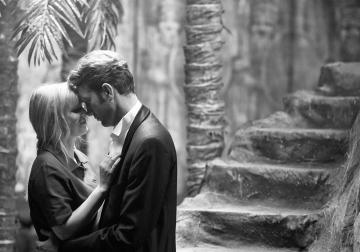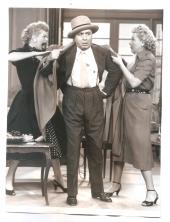Oscar-nominated 'Cold War' is a powerful Polish love story
Long after color cinematography became the norm, many of our finest films were still shot in “glorious black and white” — from “”Citizen Kane” and “Casablanca” in the 1940s down through “To Kill a Mockingbird” and “Dr. Strangelove” in the ’60s, “Raging Bull” (1980), “Schindler’s List” (1993) — but precious few since, aside from “The Artist” (2011’s Oscar-winning best picture).
There could be no better choice than a black-white-and-gray palette for “Cold War,” the passionate and intensely atmospheric love story of two fatefully mismatched but permanently attached artists in the ruins of post-World War II Poland.
Wartime romances — hot and cold alike — seem to disproportionately involve nightclub owners, singers or piano players. In the one at hand, we meet gorgeous Zula (Joanna Kulig) as a budding young dancer in the boondocks, auditioning for a Polish folk ensemble directed by taciturn Viktor (Tomasz Kot).
- Starring: Joanna Kulig, Tomasz Kot.
- Rating: R for sexual content, nudity and language.
Zula — a tougher cookie than she looks — did some jail time for stabbing her father. Viktor asks why she did it.
“He mistook me for my mother,” she replies, “so I showed him the difference with a knife.”
Viktor himself is pretty tough, with rough stuff reserved for Zula later. In Communist Poland, “the people’s auditioners” now want peasant-style music — “the priceless treasures of our nation’s proletariat,” he says. The troupe’s purpose is to promote ethnic Polish folk music. Never mind that neither he nor she really believes in it — or that a picture of banned Russian composer Dmitri Shostakovich on Viktor’s bookshelf hints at Viktor's possible future defection.
Zula, needless to say, lands the job and, soon enough, has an affair with Viktor. But as their group becomes increasingly popular, it is “suggested” they start singing more about Comrade Stalin, which they do. The reward is an appearance in East Berlin, whence they plan to escape to the West, if all goes well.
Which it doesn’t.
Director-writer Pawel Pawlikowski is known to us for his Oscar-winning “Ida” (2013), the wrenchingly beautiful tale of a novitiate Catholic nun with Jewish roots. This “Cold War,” a Polish/French/UK co-production — Oscar-nominated for best foreign film, director and cinematography — is no less stunning. Its protagonists turbulent relationship was inspired by that of the director's own parents, who split and reunited several times while moving from one country to another after the war, and by the seminal Polish folk-dance troupe Tanca Mazowsze (not unlike Pittsburgh’s own Tamburitzans), whose signature song “Dwa serduszka, cztery oczy” (Two hearts, four eyes) provides the film’s lovely leitmotif.
Two particularly powerful scenes: In the first, Zula watches a piano competition — everything in Poland is competitive, to survive. It meant your life. Though they deeply hate each other, Poles and East Germans must establish — or pretend to — good fraternal Communist relations. In the second, she is obliged to dance sexily — but minus the least bit of desire or affectionm — with a handsome German soldier, even as Viktor is being enlisted to rat on the Polish emigre community.
Ms. Kulig’s smoldering performance is worth the price of admission in itself. She’s clearly channeling Lauren Bacall’s laconic-sardonic delivery throughout, but especially during a recording session when exhorted to “Believe in yourself!”
“I do,” she replies, “It’s you I don’t believe in.”
This epic if elliptical story of imprisonment and escape starts out with old guys peeing against a tree in a barren snowscape landscape of church estate ruins, which eventually turn into the multiple love ruins of Poland, Berlin and Yugoslavia — and the sophisticated jazz ruins of Paris, where old Louis Armstrong tunes compete with “Rock Around the Clock.” The soundtrack, from its opening accordion and Polish drinking songs through all the later chanteuse-y “Vie en Rose”-style renderings, perfectly complement the long, lingering photographic takes in which we can indulge in searching up and down each frame, for the back- vs. front-focus action — conflicting revelations you’d never notice in color!
Nighttime is when black-and-white photography most excels. That, plus the concomitant genius of cinematographer’s Lukasz Zal’s lighting, makes this experience more memorable than its protagonists’ vain wish:
“Let’s get to the other side — life will be better there”
Famous last words, then and now, about walls.
Post-Gazette film critic emeritus Barry Paris: parispg48@aol.com.







